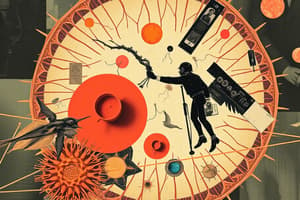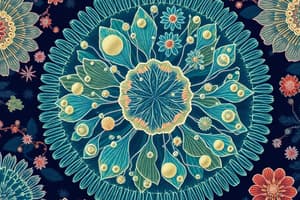Podcast
Questions and Answers
What is considered the smallest structural and functional unit of an organism?
What is considered the smallest structural and functional unit of an organism?
- Cell (correct)
- Tissue
- Organ
- Organism
Which of the following characteristics of living things does NOT apply?
Which of the following characteristics of living things does NOT apply?
- Living things are composed solely of non-cellular structures (correct)
- Living things grow in size
- Living things respond to their environment
- Living things can reproduce
Which organelle is primarily responsible for energy production in a cell?
Which organelle is primarily responsible for energy production in a cell?
- Ribosome
- Mitochondria (correct)
- Endoplasmic reticulum
- Nucleus
What is the primary function of the nucleus in a cell?
What is the primary function of the nucleus in a cell?
Which organelle is specifically found in plant cells and assists in photosynthesis?
Which organelle is specifically found in plant cells and assists in photosynthesis?
What structural difference is specific to plant cells as compared to animal cells?
What structural difference is specific to plant cells as compared to animal cells?
Why is diffusion considered important for cells?
Why is diffusion considered important for cells?
Which organelle serves as a storage area and helps maintain turgor pressure in plant cells?
Which organelle serves as a storage area and helps maintain turgor pressure in plant cells?
What is the primary difference between diffusion and osmosis?
What is the primary difference between diffusion and osmosis?
Why is osmosis essential for cells?
Why is osmosis essential for cells?
Which of the following statements about unicellular organisms is false?
Which of the following statements about unicellular organisms is false?
What is the correct order of organization in multicellular organisms?
What is the correct order of organization in multicellular organisms?
How do multicellular organisms exchange gases?
How do multicellular organisms exchange gases?
Which of the following lists the correct structure and function relationship?
Which of the following lists the correct structure and function relationship?
What would happen if water concentration inside a cell is higher than outside?
What would happen if water concentration inside a cell is higher than outside?
Which of the following pairs correctly match an example with its classification?
Which of the following pairs correctly match an example with its classification?
Flashcards are hidden until you start studying
Study Notes
What is a cell?
- The smallest structural and functional unit of an organism.
- Typically microscopic.
Characteristics of living things
- Grow in size
- Reproduce
- Repair themselves
- Require energy
- Respond to their environment
- Have a lifespan
- Made of one or more cells
- Produce waste
Cell Theory
- All living things are made up of one or more cells.
- The cell is the basic unit of life.
- All cells come from pre-existing cells.
Who discovered cells?
- Robert Hooke, around 1665.
Organelles
- Mitochondria: Powerhouse of the cell.
- Nucleus: The "brain" of the cell, helps with cell growth.
- Cytoplasm: A goopy substance that holds the cell's parts together.
- Vacuole: Works like a vacuum, stores water and nutrients.
- Cell Wall: Protects the outer layer of plant cells.
- Chloroplasts: Found in plants, help with photosynthesis.
- Cell Membrane: Keeps the cell separate from its environment.
Plant vs. Animal Cells:
- Plant cells: Have cell walls, chloroplasts, and larger vacuoles.
- Animal cells: Do not have cell walls or chloroplasts, but contain lysosomes.
Diffusion
- The movement of particles from an area of high concentration to an area of low concentration.
- Essential for cells to obtain nutrients and remove waste.
Osmosis
- A special type of diffusion involving water molecules.
- Water moves from an area of high concentration to an area of low concentration across a semi-permeable membrane.
- Key for maintaining proper water levels within cells.
Unicellular vs. Multicellular Organisms
- Unicellular: Made up of a single cell, move with structures like cilia, flagella, or pseudopods, absorb nutrients directly from the environment, exchange gases through the cell membrane.
- Multicellular: Made up of many cells, use muscles/skeletons for movement, have specialized systems for digestion and gas exchange.
Examples of Unicellular Organisms
- Amoeba
- Paramecium
- Bacteria
- Diatoms
Organ Levels in Multicellular Organisms
- Tissues: Cells with similar functions group together, e.g., muscle tissue.
- Organs: Different tissues work together, e.g., the heart.
- Organ Systems: Organs work together, e.g., the circulatory system.
Multicellular Organism Organization
- Cells are organized into tissues, organs, and organ systems.
Levels of Permeability
- Not provided in the text, this question needs further clarification.
Studying That Suits You
Use AI to generate personalized quizzes and flashcards to suit your learning preferences.




